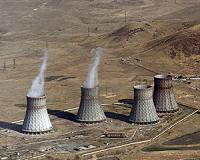 |
Buenos Aires (UPI) Sep 17, 2010 Argentina is moving forward with a long-term strategy to expand its nuclear program that includes the building of a new plant and refurbishment of existing heavy-water reactors. Argentina and South Korea this week signed a memorandum of understanding that will see Korean expertise being deployed in both new and existing nuclear power installations to bolster the national grid. Widely seen as an answer to Brazil's revival of its nuclear industry, including enrichment and defense-related technologies, Argentina's nuclear program will aim to push forward President Cristina Fernandez de Kirchner's aim of putting the country on the map as a nuclear power, a strong contender for regional nuclear supremacy. Brazil's nuclear industry is more advanced than Argentina's, but the Argentine nuclear activities in the dictatorial period of the 1980s included a nuclear weapons program known only to U.S. and other Western nuclear watchdog bodies. So advanced was the Argentine program of acquiring weapons of mass destruction in that period that it required U.S. intervention to secure cancellation or deferment of a long-range missile project. The aim of the program was to secure political pre-eminence for the dictatorial regime. Argentina scrapped the 620-mile Condor 2 missile project under U.S. pressure but remained vague about the Alacran missile project. Military analysts suspect Alacran remains very much an "active" project, though few reliable details have come to light. Thursday's accords with South Korea marked both sides pledging bilateral nuclear collaboration, but analysts said Argentina would be looking to acquire upgraded technologies for its nuclear program, though defense applications would remain off public agenda. Argentina aims to increase the nuclear share of its power grid from about 6 percent to 15-25 percent in the next 10-15 years. Since the end of dictatorial rule, Argentina has signed on to non-proliferation accords and joined Brazil and Chile in pledging to stay clear of chemical or biological weapons. However, analysts said Brazil's recent emphasis on accelerating its nuclear program could influence Argentina's nuclear program and also affect Chile's nuclear plans. Last year Brazil secured French agreement to work on joint manufacture of a nuclear-powered submarine that, when implemented, could trigger copycat actions in other countries with advanced nuclear research capabilities, analysts said. Latin American countries with nuclear-power programs in various stages of implementation include -- besides Argentina, Brazil and Chile -- populist Venezuela. The existence of rich uranium deposits on the continent has drawn investors from as far afield as Iran and China. Argentina has two nuclear power plants in operation and expects to complete work on another next year. It has announced plans to start building light-water reactors as of 2011. Work on previously announced plans has been delayed by poor financing. The new MOU with South Korea is set to change that. Korea Electric Power Corp. and Korea Hydro and Nuclear Power will be leading both new construction and overhaul of existing plants, including the Embalse nuclear power station. A technical team from Nucleoelectria Argentina S.A. and the National Atomic Energy Commission will travel to South Korea to work out the details of the Asian country's involvement. Argentina hopes it will secure better terms from South Korea, which sees Buenos Aires as a staging post for an aggressive sales drive, already in evidence in the Middle East. South Korea won a $40 billion nuclear power contract with the United Arab Emirates in December, becoming the world's sixth exporter of nuclear power facilities after the United States, Russia, Japan, France and Canada.
Share This Article With Planet Earth
Related Links Nuclear Power News - Nuclear Science, Nuclear Technology Powering The World in the 21st Century at Energy-Daily.com
 MIT study upbeat on nuclear power growth
MIT study upbeat on nuclear power growthWashington (UPI) Sep 17, 2010 Nuclear power use is growing worldwide but the high costs of setting up plants, disposing of waste and worries over abuse are holding back expansion, a new study by the Massachusetts Institute of Technology said. "To enable an expansion of nuclear power, it must overcome critical challenges in cost, waste disposal and proliferation concerns while maintaining its currently excellent saf ... read more |
|
| The content herein, unless otherwise known to be public domain, are Copyright 1995-2010 - SpaceDaily. AFP and UPI Wire Stories are copyright Agence France-Presse and United Press International. ESA Portal Reports are copyright European Space Agency. All NASA sourced material is public domain. Additional copyrights may apply in whole or part to other bona fide parties. Advertising does not imply endorsement,agreement or approval of any opinions, statements or information provided by SpaceDaily on any Web page published or hosted by SpaceDaily. Privacy Statement |